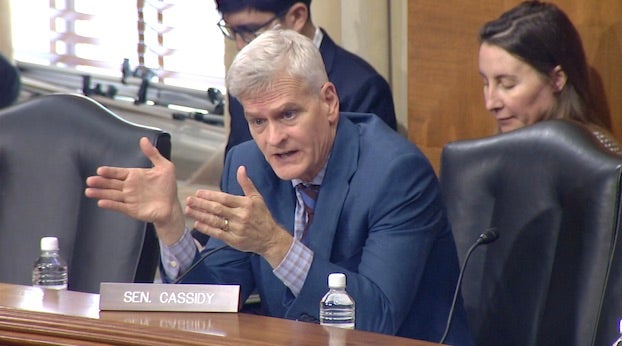Making safe places
Published 2:28 pm Monday, January 22, 2018
Brian and Kitty Johnson share world view of home making and care taking
Brian and Kitty Johnson, natives of Lake Charles, love their Lake Charles family, friends and beautiful Canal Place home.
Trending
However, their view of home extends beyond Southwest Louisiana. Brian permanently resides in Saudi Arabia throughout the year. Kitty joins him much of that time. He was recently home for a brief visit.
The Johnsons started out like a lot of people who call Lake Charles home. They are Barbe High School graduates. She attended LSU. He went to McNeese. They met, fell in love and married.
After graduating from McNeese, Brian was commissioned an officer in the US Army and departed for his first duty assignment in Europe. Kitty joined him in Germany two weeks after they were married.
“We have moved about 10 times in 22 years and have called Germany, Belgium, and Saudi Arabia our home,” Brian said. “That’s our life, a move every couple of years. No big deal. She figures it out.”
By “figuring it out” Brian means his wife has a knack for not only quickly adapting, but also for making others feel welcomed and safe. She said she has taken what she has learned from her grandmother, her mother and her mother-in-law about making a house a home.
She did it as an army wife. She does it in Lake Charles. And she does it in Rhiyadh, Saudi Arabia, where Brian, now retired from the army, works as a security specialist. She also camps with her husband when they visit the African bush, where the couple have awakened to the backside of an elephant grabbing a quick breakfast of straw thatch from the roof and where her bare feet have come far too close to a poisonous snake or two.
Trending
Life in the suburbs, working nine to five, 365 days a year is not Brian’s idea of living. This couple has been married 25 years – and it has been an adventure.
His interest in wildlife conservation — sparked by Laura Lanza in the 1970s — never left him.
“We do conservation work every chance we get,” Brian said. We are not professional conservationists or biologists; we are merely passionate about doing our part, however little that may seem to us in the big scheme of things.”
The Johnsons have visited Tanzania, Zambia, Namibia and Kenya. Most recently, wildlife conservation efforts have been focused on slowing the rapid decline of the elephant population threatened by poaching, overgrazing, loss of traditional ranges and human encroachment.
“The most immediate threat is poaching for ivory,” Brian said. “It’s been reported that the trade helps fund African militant groups.”
The poaching leaves a gruesome aftermath, elephant carcasses with faces hacked off, often with power saws. Elephants are poisoned with cyanide at salt licks and watering holes, which affects other wildlife. Elephants are machine gunned from helicopters. Infants left behind are difficult to keep alive. The trauma of witnessing the mother’s death is part of the reason. Elephants, scientists have determined, are capable of complex thought and deep feeling. Emotional attachment between family members could rival that of humans.
“The elephant population has declined about 30 percent,” Brian said. “In 2009, the Great Elephant Census reported a decrease in Tanzania from about 109,051 elephants to about 43,000. On the average, ninety-six elephants are lost to poaching every day.”
In 2015, Brian summited Mount Kilimanjaro, Africa’s highest peak, to raise awareness and funds for Save the Elephants. Its mission is to secure a future for elephants and to sustain the beauty and ecological integrity of the places they live; to promote man’s delight in their intelligence and the diversity of their world and to develop a tolerant relationship between the two species. Save the Elephants partners with U.S.-based Wildlife Conservation Network.
If the elephant population continues to decline at current rates, the elephant, symbolic for its power and strength throughout many cultures, could one day be extinct.
In March, Brian and a team of climbers concerned about the elephant’s future will tackle Mount Kenya, Africa’s second highest peak and Kenya’s tallest mountain.
“All the funds raised go directly to Save the Elephants,” Brian said. “We pay our own way. The other climbers pay their own way.”
For Brian and Kitty, “home” transcends four walls and a roof. They have” adopted” an extended “family” of people from different backgrounds, cultures and traditions. Their idea of caretaking extends to conservation efforts to ensure future generations will have the opportunity to enjoy wildlife, and in particular, elephants, a species with emotions and family ties akin to human family ties.
One of Brian and Kitty’s favorite quotes is from David Orr from Ecological Literacy: Education and the Transition to a Post Modern World: “The plain fact is that the planet does not need more successful people. But it does desperately need more peacemakers, healers, storytellers and lovers of every kind. It needs people who live well in their places. It needs people of moral courage willing to join the fight to make the world habitable and humane. And these qualities have little to do with success as we have defined it.”
The Johnson’s house contains elephant paintings and other decor. The elephant has a special meaning for them. However, the elephant can be used as a motif in any home. According to animalsymbols.com, the elephant is considered a symbol of good luck, wisdom, loyalty, strength, fidelity and longevity.
Canal Place home of Brian and Kitty Johnson
While the Johnson’s have, on occasion, stayed in five-star hotels during their travels in Africa, the more frequent lodging is a camp such as this one shown here in Zambia. They were awakened one morning to see an elephant dining on the roof thatch.





